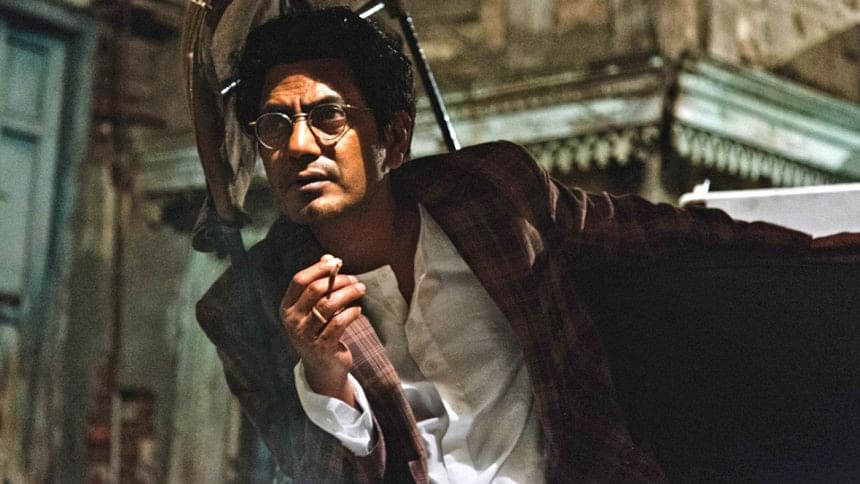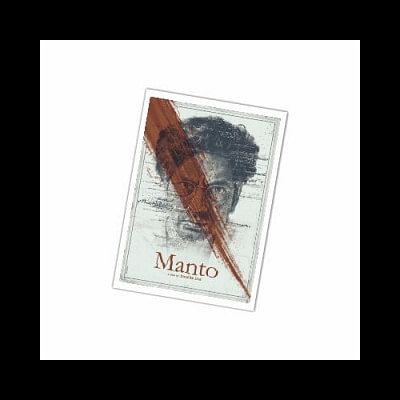Invoking the “Mantoiyat”

“This is a particularly timely film and in many ways, and perhaps self-contradicting ways, a comforting film. It was a reminder that the battles that artists, filmmakers, writers, whoever face—these are not new things,” commented writer Annie Zaidi on Manto in an interview with its director Nandita Das at this year's Dhaka Lit Fest. Her eponymous biopic on one of the most prolific and celebrated Urdu short-story writers, depicts the most tumultuous period of the author's life, following the author as he migrates from Bombay to Lahore during Partition, battles obscenity cases, alcohol and misfortune, and in fact intends to leave the viewer “a little disturbed by what we do to people who have chosen to speak the truth despite all odds.” It happened then, it's happening now, it's happening everywhere, she says. When rediscovering Manto all over again in 2012 through his essays, it was exactly this feeling which compelled her to tell his story.
Das describes Saadat Hasan Manto's body of work, consisting of 300 short stories, hundreds of essays, hundreds of screenplays, and biographical sketches, as “very modern in his own time”. “The way he looked at characters, the kind of agency he gave to women, the stories about sex workers—it wasn't just empathy, it was an understanding of the human condition,” she explains. With his partition work, his stories were never epic—they had been very intimate, the lens very personal. And that is what the director tried to achieve with her own storytelling—get as close to the subject as one possibly can.
Her “six-year labour of love” involved poring through his oeuvre, through libraries, doing countless recces and taking Manto “walks” retracing his footsteps in Bombay, and finally uncovering precious anecdotes that she wove into her two-hour-long screenplay. She bases it almost entirely on Manto's own writings and dialogues. And where Manto ends, Das begins, filling in the gaps with educated inferences, touching interactions, and interspersion of his own short stories.
As a movie, Manto does not give into excesses, be it in portraying drunkenness, anger or insanity. Nawazuddin Siddiqui as Manto is well-balanced, his acting measured, as is Rasika Dugal's—the actor who plays his demure, virtuous, undemanding wife, Safia Manto.
As biopics go, not an abundance of room is often left for side characters, and the limelight is probably only shared with the memorable protagonists of Manto's own chilling tales, woven effortlessly into the storyline. In an alley in which Manto lights a cigarette, we are transported to a sleeping prostitute, her pimp and their damned intertwined fate (“The Hundred Watt Bulb”). In the neighbourhood where he lives, a young girl child is made to leave her playground games and “accompany” a group of men (“Ten Rupees”). In his own words, if you cannot bear his stories, it is because we live in unbearable times.

In perhaps one of the lighter, more sentimental scenes, he entertains his wife with a game of guessing the back story of a woman with a particularly hairy upper lip in the park (“Mr Hameeda”). But that is also the man Manto was. In his own words, “I may be a writer of obscene stories, a clown, but I am also a husband and a father.” He made pickles, ironed his wife's saris, made little figurines out of cigarette paper foil for his daughters, and recited nonsensical verse.
But maybe every father is an absent father, and Das makes it a point to pique his flaws. In a bout of alcohol and depression, he forgets the time when he goes out to fetch medicine for his sick daughter. This final act snaps something in the ever-placid Safia. Indeed, in this day and age, and next to her fiery husband and the equally fiery literary stalwart Ismat Chughtai, it is easy for one to think, “Isn't she too soft-spoken, doting and faultless, to the point of being one-dimensional?” Surely with a husband like that one couldn't have remained that placid. And yet, Dugal's acting is perhaps completely on-point—Safia is perfectly reminiscent of a certain kind of woman from a past generation—virtuous, supporting, quietly suffering.
Das said, “Usually when you tend to do these biopics the trajectory is that an ordinary man goes through something extraordinary and becomes this extraordinary sportsman or politician or artist. But Manto was riddled with so many contradictions.”
Indeed, Das made it a point not to put him on a pedestal. “Through his ego, through his arrogance, through his alcoholism, his pure intent of wanting to tell the truth, tell things as they are, despite all odds, the fact that he was so compelled to write kept putting him in trouble. And yet he was a family man, unlike many other writers who have had their muses and history has forgiven them, but he cared about his family—which was a direct conflict with his compulsion to write and drink.”
On the brink of losing his mind, Manto calls out to his friend Ismat Chughtai in his head, asking her to make him come back to Bombay. And yet he doesn't open her letters, he never goes back. His reasons for leaving, as Das explains, are unknown and simply based on her inferences—his reasons for not returning are just as unclear, in spite of growing sufferings in the city of Lahore.
However, it is the last couple of scenes of the movie which invoke one of his greatest short stories, “Toba Tek Singh”, that are the most painful. Set in a mental asylum where, upon acknowledging his alcoholism, he has come for treatment, the Hindu mentally ill are being sent to India and the Muslims are being sent to Pakistan. Here we find our hero—in the midst of madmen who cannot tell one country from another, where an aging Sikh patient who is being sent to India is looking for his hometown of Toba Tek Singh (located in Punjab). Toba Tek Singh represents perhaps a place that may or may not exist, one that never has existed, but one that the heart wishes to return to nonetheless. Here we leave Manto, hateful of what has become of his life in the grey, broken Lahore, leaving Bombay for physical safety, at the expense of his mental safety. Yet, we leave him not as the picture of defeat, but as the image of defiance, eyes full of fire.
Nandita Das tries her best to get into the mind of Manto, but what she truly succeeds at is spreading the spirit of the man—the “Mantoiyat” or being more honest, more courageous, and more free-spirited—through the interweaving of the touching tale she tells and the touching tales that he told.

 For all latest news, follow The Daily Star's Google News channel.
For all latest news, follow The Daily Star's Google News channel. 



Comments